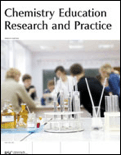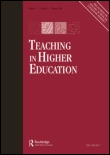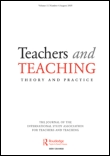
International Journal of Mathematical Education in Science and Technology
Scope & Guideline
Innovating Pedagogy: Bridging Math, Science, and Technology
Introduction
Aims and Scopes
- Mathematics Education Research:
The journal emphasizes empirical research that investigates teaching and learning processes in mathematics, exploring how students understand mathematical concepts and the pedagogical approaches that best support this understanding. - Integration of Technology:
A core area of focus is the use of technology in mathematics education, examining how digital tools, software, and online platforms can enhance learning experiences and outcomes for students at various educational levels. - Innovative Teaching Strategies:
The journal publishes studies on innovative teaching methods, including inquiry-based learning, blended learning, and active learning strategies, aimed at improving students' engagement and achievement in mathematics. - Curriculum Development and Evaluation:
There is a strong emphasis on curriculum development, evaluation, and reform, particularly in relation to how mathematics is taught in primary, secondary, and tertiary education, ensuring that curricula meet the evolving needs of learners. - Interdisciplinary Connections:
The journal explores the connections between mathematics and other disciplines, particularly STEM fields, and how these interdisciplinary approaches can enrich mathematics education and promote critical thinking among students. - Equity and Diversity in Mathematics Education:
Research addressing issues of equity, diversity, and inclusion in mathematics education is a significant focus, investigating how various factors such as race, gender, and socioeconomic status influence students' learning experiences and outcomes.
Trending and Emerging
- Online and Blended Learning:
The impact of online and blended learning models has surged, particularly following the COVID-19 pandemic, leading to an increase in studies exploring their effectiveness and best practices in mathematics education. - Mathematical Modelling:
There is a growing emphasis on mathematical modelling as a pedagogical tool, with research exploring how it can enhance problem-solving skills and facilitate deeper understanding of mathematical concepts among students. - Social Justice in Mathematics Education:
Emerging research focuses on social justice issues within mathematics education, examining how teaching practices can be adapted to promote equity and inclusion for diverse student populations. - Cognitive and Affective Factors in Learning:
An increasing number of studies are investigating the cognitive and emotional aspects of learning mathematics, such as anxiety, motivation, and self-efficacy, and their influence on student performance. - Use of Artificial Intelligence and Digital Tools:
The integration of AI and advanced digital tools in mathematics education is on the rise, with research exploring their potential to personalize learning and enhance student engagement. - Collaborative Learning Environments:
Research highlighting collaborative learning strategies is trending, emphasizing the importance of peer interactions and group work in fostering a deeper understanding of mathematical concepts.
Declining or Waning
- Traditional Lecture Methods:
There is a noticeable decline in papers focusing on traditional lecture-based teaching methods, as the field increasingly favors more interactive and student-centered approaches to mathematics education. - Focus on Pure Mathematics:
Research centered on pure mathematics concepts, without direct applications to teaching and learning, has diminished, reflecting a shift towards studies that integrate practical applications and real-world relevance in mathematics education. - Standardized Testing Practices:
The discourse around standardized testing and assessment methods in mathematics has waned, as educational research shifts towards more formative and authentic assessment practices that better capture student learning. - Historical Perspectives in Mathematics Education:
While historical analyses of mathematics education have been relevant, this theme has seen less frequency in recent publications, indicating a move towards contemporary issues and practices that directly impact current educational settings. - Single-Discipline Studies:
There is a decreasing focus on studies that examine mathematics education in isolation, with a growing trend towards interdisciplinary research that connects mathematics to other subjects and real-world applications.
Similar Journals

Chemistry Education Research and Practice
Connecting Research and Practice to Enhance Chemistry EducationChemistry Education Research and Practice is a prominent journal dedicated to advancing the field of chemistry education through rigorous research and innovative practices. Published by the Royal Society of Chemistry, this journal, with an ISSN of 1109-4028 and an E-ISSN of 1756-1108, operates out of Greece and has established itself as a leading voice in the intersection of chemistry and educational methodology. With a remarkable impact factor and ranking in the top quartiles (Q1) for both Chemistry and Education in 2023, it appeals to a diverse audience of researchers, educators, and practitioners who are passionate about enhancing chemistry instruction and learning experiences. The journal spans a wide range of topics, aiming to promote and disseminate high-quality research that informs pedagogical strategies, curriculum development, and educational policy. By providing a platform for vibrant discussions and new ideas, Chemistry Education Research and Practice plays a crucial role in shaping the future of chemistry education worldwide and continues to impact the academic community significantly.

International Journal of Education and Information Technologies
Bridging the Gap between Learning and TechnologyWelcome to the International Journal of Education and Information Technologies, a leading academic platform published by NORTH ATLANTIC UNIV UNION-NAUN. With an emphasis on the integration of education and information technology, this journal aims to foster innovative research and discussions that enhance pedagogical practices and technological advancements in educational contexts. Although currently an open access journal, it provides unrestricted access to emerging studies that are crucial for educators, researchers, and professionals aiming to stay at the forefront of education technology. While specific metrics such as H-index and Scopus ranks are yet to be defined, its ISSN 2074-1316 signifies its credibility and commitment to quality scholarship. This journal serves as a vital resource for those passionate about bridging the gap between technology and education, encouraging impactful research that shapes the future of learning environments.

Medical Science Educator
Bridging gaps in medical science and educational excellence.Medical Science Educator, published by SpringerNature, is an esteemed journal committed to advancing the intersection of educational methodologies and medical science. With a significant impact in its field, this journal holds a Q2 ranking in both Education and Medicine (miscellaneous) categories as of 2023, reflecting its dedication to high-quality research and scholarly dialogue. Operating in a digital format, the journal uniquely facilitates access to pivotal studies from its inception in 2011 until 2024, fostering innovation in medical education. The latest rankings highlight its credibility, placing it at the 63rd percentile in Social Sciences - Education and the 56th percentile in Medicine - Medicine (miscellaneous) within Scopus. This platform serves as an invaluable resource for educators, researchers, and practitioners aiming to enhance teaching practices and shape the future of medical education.

Journal of Science Education and Technology
Shaping Tomorrow’s STEM Leaders Today.The Journal of Science Education and Technology, published by SPRINGER, stands as a premier platform in the fields of education and engineering, recognized with a prestigious Q1 ranking in both categories as of 2023. With an ISSN of 1059-0145 and an E-ISSN of 1573-1839, this journal serves as a pivotal resource for researchers, educators, and practitioners alike, emphasizing the integration of scientific inquiry and technological advancements in educational contexts. Since its inception in 1992, the journal has consistently provided high-quality, peer-reviewed research that shapes contemporary practices and methodologies in science education. With its notable Scopus rankings, including a 95th percentile in Social Sciences Education, the journal is essential for anyone eager to enhance their understanding of effective teaching in STEM fields. While the journal is not open access, its contributions are invaluable to advancing knowledge and innovations that are crucial for the progressive education landscape, making it a must-read for scholars and students committed to excellence in science education.

TEACHING IN HIGHER EDUCATION
Championing effective strategies for student engagement.TEACHING IN HIGHER EDUCATION is a premier academic journal published by Routledge Journals, Taylor & Francis Ltd, dedicated to advancing the scholarship and practice of teaching within the higher education sector. With an ISSN of 1356-2517 and an E-ISSN of 1470-1294, this journal is widely recognized for its profound impact in the field, boasting a 2023 category rank of Q1 in Education, placing it in the top tier of educational research. Its commitment to fostering an inclusive and dynamic discourse on pedagogical methods and learning frameworks makes it essential reading for researchers, educators, and policymakers alike. Spanning topics such as student engagement, curriculum development, and innovative teaching strategies, TEACHING IN HIGHER EDUCATION aims to contribute to ongoing conversations and practical applications that enhance the educational landscape. While an Open Access option is not available, the journal maintains a robust readership, with its articles being rigorously peer-reviewed and disseminated to reflect cutting-edge research trends and practices in education.

MIER-Journal of Educational Studies Trends and Practices
Empowering educators with cutting-edge insights and practices.MIER-Journal of Educational Studies Trends and Practices is a pivotal academic journal dedicated to advancing the field of education, focusing on innovative research and trends that influence teaching and learning practices. Published by the esteemed MODEL INST EDUCATION & RESEARCH, this journal offers a platform for researchers, educators, and students to disseminate knowledge and insights on various educational methodologies, curricular developments, and pedagogical theories. While the journal's current impact factor is not specified, its commitment to fostering scholarly discourse positions it as a notable contributor to the field. With an ISSN of 0976-8203 and an E-ISSN of 2319-1945, MIER aims to promote open access to current educational research, making it accessible to a global audience. By engaging with contemporary educational issues and emerging practices, this journal serves as a valuable resource for those dedicated to enhancing educational outcomes and developing effective teaching strategies.

International Journal of Instruction
Illuminating the path to effective instructional strategies.International Journal of Instruction is a distinguished peer-reviewed journal dedicated to advancing the field of education through high-quality research and innovative instructional practices. Published by GATE Association for Teaching & Education in Switzerland, this open-access journal has been a beacon of knowledge since its inception in 2008, ensuring that impactful educational research is freely accessible to scholars, educators, and practitioners worldwide. With an impressive Q2 ranking in Education and a notable position in the 80th percentile within its category in Scopus, the journal showcases cutting-edge studies and discussions that reflect current trends and methodologies in teaching and learning. The scope of the journal includes a wide array of topics, ranging from instructional strategies to curriculum development, making it a vital resource for anyone engaged in the dynamic landscape of education. Explore the International Journal of Instruction today to contribute to and benefit from the collective wisdom of the global educational community.

Teaching Statistics
Cultivating Knowledge, Inspiring Educators in Statistics.Teaching Statistics is a peer-reviewed journal published by Wiley, dedicated to the advancement of statistical education and pedagogical methodologies. With its ISSN 0141-982X and E-ISSN 1467-9639, this esteemed journal has been an integral resource since its inception in 1979, providing a platform for innovative research and practices aimed at enhancing teaching effectiveness in statistics across various educational levels. Housed in the United States, it maintains a significant global presence and engagement, evidenced by its Q3 quartile rankings in both the Education and Statistics and Probability categories as of 2023. Furthermore, it holds commendable Scopus rankings, reflecting its influence in the fields of Mathematics and Social Sciences. Although not an Open Access journal, it fosters a wealth of knowledge beneficial to researchers, educators, and students alike, striving to elevate the standards of statistics education through comprehensive discussions and analyses. Through its commitment to the dissemination of valuable insights and resources, Teaching Statistics continues to be a vital asset for academic and professional communities seeking to enhance statistical learning and teaching methodologies.

Teachers and Teaching
Driving Policy Development with Scholarly ExcellenceTeachers and Teaching is a premier scholarly journal published by Routledge Journals, Taylor & Francis Ltd, providing an essential platform for researchers, educators, and practitioners in the fields of Education and Arts and Humanities. With an editorial focus on the dynamics of teaching and learning, the journal aims to share innovative research and insightful discussions that enhance pedagogical practices and policy development. Notably, it has achieved a Q1 ranking in both the Arts and Humanities and Education categories, signifying its impact and relevance in educational research, as reflected in its Scopus rankings, with an 84th percentile for Arts and Humanities and a 76th percentile in Education. Although it does not offer open access, the journal provides extensive access options for libraries and institutions, making its rich content available to a wide audience. Spanning from 1995 to 2024, Teachers and Teaching continues to set the standard for high-quality scholarship in the evolving landscape of education, inviting contributions that explore challenges and innovations in teaching methodologies.

TEACHING OF PSYCHOLOGY
Inspiring Educators to Unlock the Potential of PsychologyTEACHING OF PSYCHOLOGY is a distinguished academic journal published by SAGE Publications Ltd, focusing on the field of psychology education. Established in 1975, this journal has carved out a vital niche in the academic landscape, facilitating the dissemination of innovative teaching practices, research outcomes, and pedagogical strategies that enhance the learning experience in psychology. With an impressive H-index indicating its influence, TEACHING OF PSYCHOLOGY is ranked in the second quartile for Education and third quartile for Psychology (Miscellaneous) in 2023, reflecting its pivotal role in these fields. The journal boasts a robust Scopus ranking, placing it within the 55th percentile for Social Sciences - Education and the 42nd percentile for General Psychology, demonstrating its relevance and reach among scholars and practitioners alike. Although it does not offer open access, it remains a crucial resource for educators, researchers, and students seeking to enhance their understanding and application of psychological principles in educational settings. By contributing to the ongoing dialogue about effective teaching methodologies in psychology, the journal aims to inspire and inform educators, fostering an environment of rigorous academic inquiry and practical application.